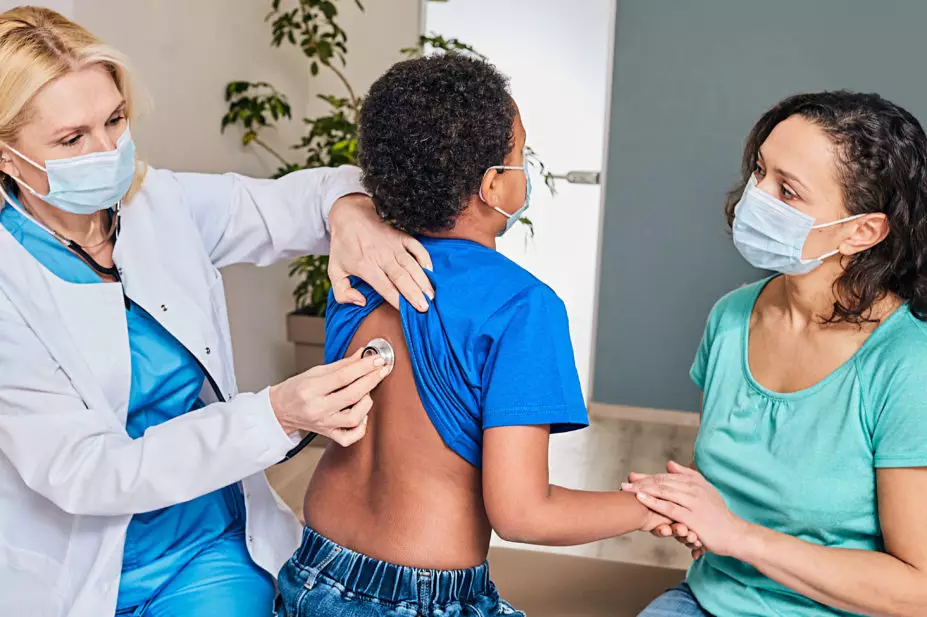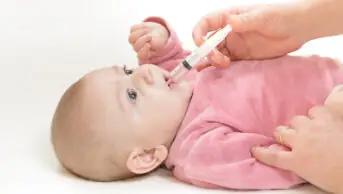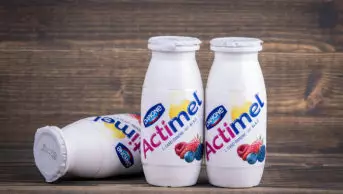
Daria Artemenko / Alamy Stock Photo
A three-day course of amoxicillin is no less effective than a seven-day course for the treatment of children with community-acquired pneumonia (CAP), research published in the Journal of the American Medical Association (JAMA) shows.
Published on 2 November 2021, the CAP-IT study is one of the largest antibiotic trials involving children globally. More than 800 children aged six months and over, with community-acquired pneumonia who had presented to hospital but were clinically suitable for discharge within 48 hours, were randomised to receive either a seven-day course of amoxicillin, or three days of amoxicillin followed by four days of placebo.
As well as comparing duration, dosing was also studied, with half of the participants in each duration group receiving a lower dose (35–50mg/kg) and the other half a higher dose (70–90mg/kg). The study also used a dosing schedule of giving two doses of amoxicillin per day, rather than three, as is currently recommended by UK guidelines.
The primary outcome was whether further antibiotic treatment was needed by the children within four weeks of initial treatment.
Overall, the researchers found that the shorter course of treatment was no less effective than the longer course; the primary outcome occurred in 12.5% of participants in both the three and seven-day treatment groups. In addition, the lower dose was no less effective than the higher dose; the primary outcome occurred in 12.6% of those in the lower dose group compared to 12.4% in the higher dose group.
The only significant difference seen between the three- and seven-day treatment groups was cough duration, with coughs lasting a median of two days longer for those in the three-day treatment group (hazard ratio [HR], 1.2 [95% CI, 1.0 to 1.4]; P=.04).
Julia Bielicki, senior lecturer in the Paediatric Infectious Diseases Research Group at St George’s, University of London and joint first author of the study, said that, although amoxicillin was the “commonest” antibiotic children receive globally, there was “surprisingly” limited evidence of the optimal dose and duration that should be used to make sure children are treated safely, minimising the impact from side effects and antibiotic resistance.
“The CAP-IT study provides family-friendly evidence that shorter durations of amoxicillin given twice daily are safe and effective even in young children with serious chest infections attending hospital,” she said.
“It has also demonstrated again that large strategic trials that inform the optimal choice of drug, dose and duration of antibiotics to treat common infections are feasible and critical to tackling antibiotic resistance.”
Jacqueline Sneddon, an antimicrobial pharmacist and member of the Royal Pharmaceutical Society’s Scottish Pharmacy Board, said the study added to a growing body of evidence that ‘shorter is better’ for many common infections.
“Adoption of this approach will support parents in ensuring patient concordance with treatment through less doses being required,” she said.
“The associated overall reduction in total antibiotic use has positive implications for antimicrobial resistance at both individual patient and population level.
Conor Jamieson, regional antimicrobial stewardship lead for the Midlands region at NHS England and NHS Improvement, agreed that the study findings were “important”.
“We know that the 0–4 [years] age group are frequently prescribed antibiotics for respiratory tract infections, and there are useful resources out there for prescribers to support appropriate prescribing and provide reassurance for parents and carers,” he said.
“In addition to safety netting and delayed prescribing, being reassured that a shorter course of amoxicillin is non-inferior for the study outcome is beneficial.
“Additionally, that twice-daily dosing was non-inferior to three times daily dosing will be a bonus for care givers, as administering antibiotics to young children can be challenging.”


